|
|
|
Sort Order |
|
|
|
Items / Page
|
|
|
|
|
|
|
| Srl | Item |
| 1 |
ID:
137446
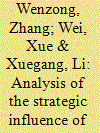

|
|
|
| 2 |
ID:
116818
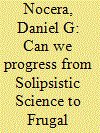

|
|
|
|
|
| Publication |
2012.
|
| Summary/Abstract |
Energy demand in the twenty-first century will be driven by the needs of three billion people in the emerging world and three billion new inhabitants to our planet. To provide them with a renewable and sustainable energy supply is perhaps the greatest challenge for science in the twenty-first century. The science practiced to meet the energy needs of the twentieth century responded to a society of wealth, and energy systems were designed to be large and centralized. However, the inability of the emerging world to incur large capital costs suggests that a new science must be undertaken, one that does not rely on economy of scale but rather sets as its target highly manufacturable and distributed energy systems that are affordable to the poor. Only in this way can science provide global society with its most direct solution for a sustainable and carbon-neutral energy future.
|
|
|
|
|
|
|
|
|
|
|
|
|
|
|
|
| 3 |
ID:
121086
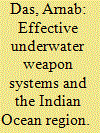

|
|
|
|
|
| Publication |
2013.
|
| Summary/Abstract |
The Indian Ocean Region (IOR) has profound strategic relevance not only for the nations in the region but also for other countries.1 The bulk of the world's merchant fleets transit through one of the busiest sea lanes in the world, via the Malacca Straits. Also, the presence of major petroleum exports originating from the Gulf, encourage the major powers of the world to have a strategic presence in the IOR. Present day naval strategies are not so much about exercising sea denial but about maintaining strategic presence, and switching to sea control whenever there is any threat to their own maritime interests. This calls for comprehensive situational awareness, and the continuous monitoring of both the surface and underwater fronts. The geographical location of India leaves it no choice but to be a major player in the IOR. Further, due to the growing energy needs of China in the recent past, and the bulk of its energy supplies transiting through the IOR, has encouraged both China and the United States to ensure their own strategic presence.
|
|
|
|
|
|
|
|
|
|
|
|
|
|
|
|
| 4 |
ID:
128726
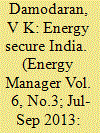

|
|
|
| 5 |
ID:
091517


|
|
|
|
|
| Publication |
2009.
|
| Summary/Abstract |
The IEA published "Energy Technology Perspectives" (ETP) in June 2008. That document reports on IEA scenarios for baseline and low-CO2 alternative scenarios to 2050, across the energy economy. The study included creating scenarios for transport, using the IEA Mobility Model (MoMo). This paper reports on the transport-related ETP scenarios and describes the model used in the analysis. According to the ETP Baseline scenario, world transport energy use and CO2 emissions will more than double by 2050. In the most challenging scenario, called "BLUE", transport emissions are reduced by 70% in 2050 compared to their baseline level in that year (and about 25% below their 2005 levels). There are several versions of the BLUE scenario, but all involve: a 50% or greater improvement in LDV efficiency, 30-50% improvement in efficiency of other modes (e.g. trucks, ships and aircraft), 25% substitution of liquid fossil fuels by biofuels, and considerable penetration of electric and/or fuel-cell vehicles. In the second half of this paper, an overview of the MoMo model is provided. Details on the complete analysis are contained in the ETP 2008 document, available at www.iea.org. Details of the LDV fuel economy analysis are contained in a separate paper in this collection.
|
|
|
|
|
|
|
|
|
|
|
|
|
|
|
|
| 6 |
ID:
130933
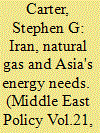

|
|
|
|
|
| Publication |
2014.
|
| Summary/Abstract |
Demand for natural gas in Asia has grown steadily during the past decade and is expected to increase considerably in the next 20 years. This growth in demand has paralleled an increasingly aggressive regime of international sanctions on Iran over its nuclear-weapons program. Considering the importance of maintaining economic pressure and political solidarity in sanctions regimes, the projected growth of demand for natural gas in some of the world's fastest-growing economies is creating both short- and long-term strategic implications for the United States and its allies. With one of the world's largest reserves of natural gas and an enviable geographical location as a likely hub for energy transit, Iran is in an excellent strategic position to benefit economically and politically from this growth in demand. While recent sanctions have dealt a damaging blow to Iran's oil exports and economy, agreement on sanctions on Iran's underdeveloped natural-gas industry has been more tepid, as nations such as Pakistan, India and China, among others, candidly weigh their options to solve increasingly dire short-term energy demand and create long-term energy security. Development of Iran's natural-gas industry to the point at which is it is able to meet demand in these nations would bring in considerable revenue for the regime, potentially enough to offset much of the economic impact of sanctions. Of particular importance to the United States and its allies, then, are answers to the following questions: Does Iran currently have the infrastructure to meet this demand? How long would it take Iran to develop the necessary infrastructure in the event nations that have expressed interest in Iran's natural gas opt against the pressure of sanctions? How likely are the above-mentioned nations to eventually contravene sanctions? How are changes in the global natural-gas industry impacting Iran's potential share of the regional and international market? And is there enough natural gas from other sources available to meet demand in nations like Pakistan, India and China?
|
|
|
|
|
|
|
|
|
|
|
|
|
|
|
|
| 7 |
ID:
127140
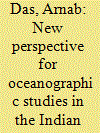

|
|
|
|
|
| Publication |
2014.
|
| Summary/Abstract |
India's location in the Indian Ocean Region (IOR) compels it to play a larger strategic role in the region. The growing energy needs of China-with the Gulf continuing to be its most preferred source-further causes the Chinese merchant fleet to transit the IOR. To ensure uninterrupted supply of energy resource, the Chinese have started to increase their presence in the region and this has, in turn, encouraged the Americans to also deploy their marine assets in the region. Keeping this in mind, for India, the emerging maritime concept of sea control requires enhanced situational awareness in the region to ensure sea denial when required.Technology has a significant role to play in such a situation and, effective sonar deployment, thus, becomes an inescapable requirement.
|
|
|
|
|
|
|
|
|
|
|
|
|
|
|
|
| 8 |
ID:
110938
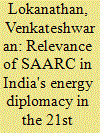

|
|
|
| 9 |
ID:
130938
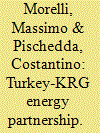

|
|
|
|
|
| Publication |
2014.
|
| Summary/Abstract |
Ten years after the U.S. invasion and two years after the complete withdrawal of American forces from its soil, Iraq faces a number of challenges to its long-term stability and development. These range from corruption to poor public services, from rising terrorist violence to ethnosectarian tensions in the context of a complex power-sharing system. An important, but often overlooked, aspect of Iraq's political scene concerns the dispute between the federal government and the Kurdish Regional Government (KRG) over the management of the country's and the Kurdish region's natural resources and over appropriate revenue-sharing mechanisms. The parties have been stuck in a costly political stalemate for the past few years, as the absence of a federal hydrocarbon law has discouraged international investment in Iraq's natural resources, and oil extracted from KRG-controlled fields has had only intermittent access to international markets.
|
|
|
|
|
|
|
|
|
|
|
|
|
|
|
|
| 10 |
ID:
091824
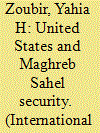

|
|
|
|
|
| Publication |
2009.
|
| Summary/Abstract |
Although the Maghreb has never been a priority, it now represents a region of significant interest for the United States. The importance of the Maghreb, and its Sahel extension, springs first from political and economic/energy interests, and second, from military, strategic and security concerns. The first relates to America's energy needs in the region, as well as to the regionalization that could create a potentially lucrative market for US businesses, especially since competition with China has increased over its recent gains in Africa. The second motivation, linked to the first, stems from Washington's new strategy and security policies initiated since 9/11 which have heightened the need for a new type of management concerning security, Islamism, terrorism, and, for a time, democratization. Unquestionably, the problems of terrorism, illegal migration, and other illegal activities are symptoms which cannot be understood if they are disconnected from their causes. However, rather than promoting economic development and good governance, the United States has focused predominantly on hard security matters and established a security system in the region which has continued under the Obama administration. Furthermore, Washington has not so far distanced itself from the regimes in the region whose authoritarianism, mismanagement of the economy, and violation of civil liberties is precisely what brought about the ills from which the Maghreb-Sahel suffers. Without addressing these issues therefore, there is little chance that the region will witness long-lasting peace, security, and prosperity. Furthermore, the protracted conflict in the Western Sahara, the resolution of which has been impeded by the geopolitical considerations of outside powers, has not only hindered the necessary construction of an integrated Maghreb, but also has the potential of leading to regional conflict.
|
|
|
|
|
|
|
|
|
|
|
|
|
|
|
|
|
|
|
|
|